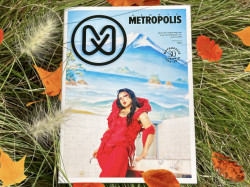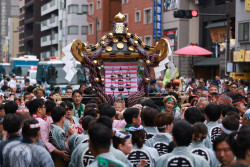
Originally published on metropolis.co.jp on June 2013

If you’ve never said, “Let’s go out for Peruvian!”—it’s probably because you’ve never tried it. One of the newest additions to Tokyo’s restaurant scene, Bépocah in Harajuku, can give you a taste.
We started with pisco sours, the classic Peruvian cocktail made with grape brandy (plus egg white, lime juice, simple syrup, and bitters), and Peruvian beer (Cusqueña)—and very quickly the cebiche (also ceviche) arrived.
Some believe cebiche was invented in Peru. And Bépocah dedicates a full page of its menu to the dish. We ordered the cebiche tradicional de pescado—a traditional fish cebiche, for the non-Spanish speakers. The preparation is simple: marinate the raw fish in lime, and add chopped hot pepper (aji limo, in this case) and cilantro. Ours was garnished with large-kernel Andean white corn, which was delicious and surprisingly unsweet.
Not all of Peru’s reported 4,000 varieties of potato are on offer at Bépocah (though they do import a handful of native Peruvian potatoes not available at your local supermarket), but you can get the idea with papa a la Huancaína, or Huancayo-style potatoes. This is a simple and tasty salad of boiled yellow potatoes with a sticky sauce of feta cheese, milk and aji amarillo (yellow hot pepper).
Starters out of the way, we ordered a creamy chicken stew—aji de gallina—made with cheese, milk and pecan nuts, and lomo saltado, stir-fried sirloin steak with red onions, tomatoes, aji amarillo and cilantro.
Everything to that point had been delicious—simple and flavorful—and we were starting to think we were full. Then, the next table took a plate of what looked like enormous beef yakitori. It was beef, as it turned out—but not steak. Our neighbors had ordered anticuchos de corazón, or beef heart. It would have been heartless for us not to order some—and the delicious aroma was indeed matched by the taste.
On the dessert score, a few fruit dishes looked interesting: an aguaymanto sorbet and a lucuma ice cream. Aguaymanto is an orange-yellow gooseberry encased in what appears to be a paper lantern, and lucuma is called “eggfruit” in English, and resembles a small papaya.
A short walk from Meiji-Jingumae station, Bépocah opened its doors this past March. Founders Bruno Nakandakari and Haruko Nishimura are friends who abandoned careers in software development and advertising to pursue their dream of opening a place that “feels like a Peruvian restaurant in Lima, not an ‘ethnic’ restaurant that caters to cultural stereotypes.”
Accordingly, the decor is elegant and understated—with not a stuffed llama to be seen.







